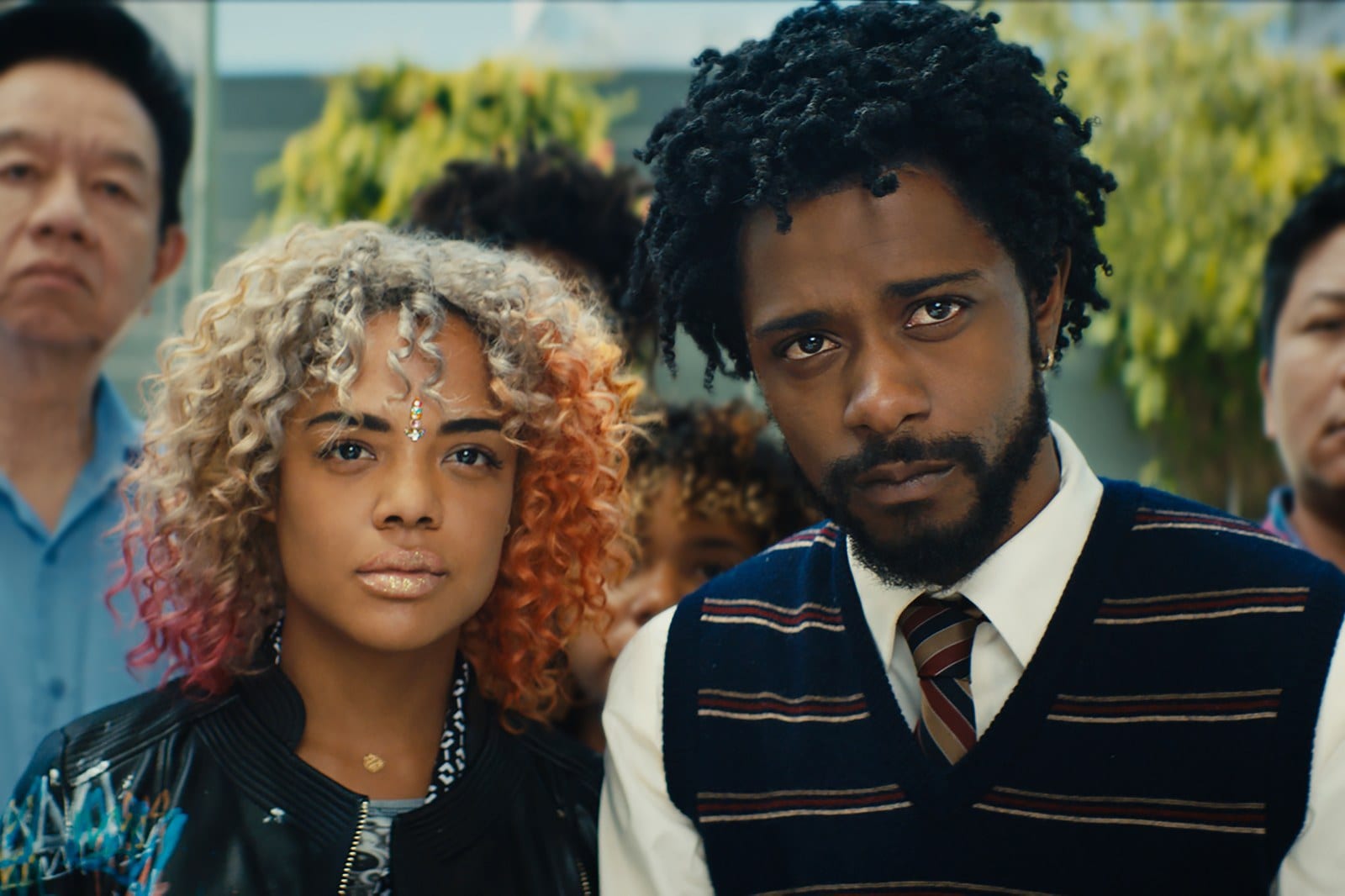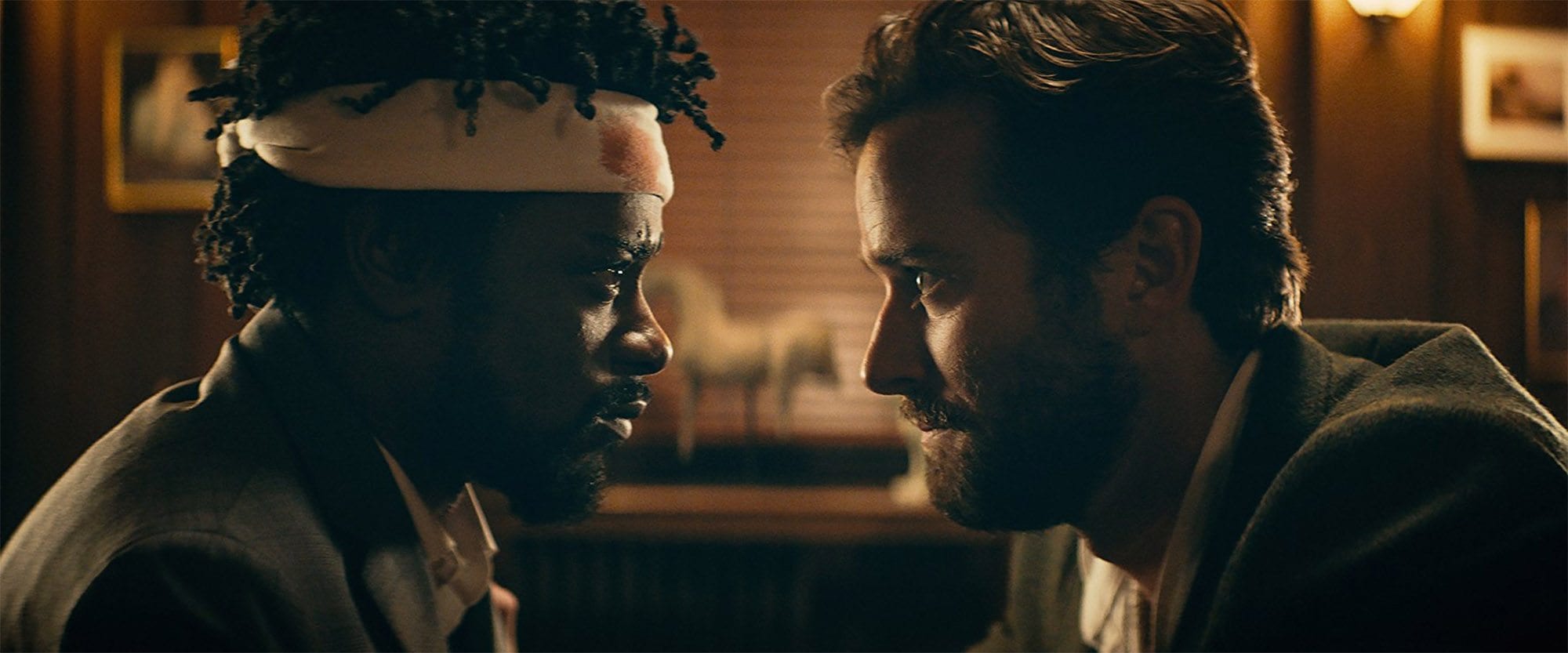
Why ‘Sorry to Bother You’ is the satire we should all be paying attention to
Listen up, sheeple! It’s time you swallowed that red pill and woke up from that dystopian dream you were having. Sorry to Bother You has some cinematic realness to lay down on your insignificant life. As well as being a total cult classic in the making, this sociopolitical, satirical film from musician-turned-director Boots Riley is the 1984 of 2018 and we need to listen to its message. So grab your coffee and let’s do this!

WeWork, you pay
The story concerns the lethargic millennial Cassius “Cash” Green (Lakeith Stanfield) who finds a job at a bottom-level telemarketing company.
Alongside his performance artist girlfriend Detroit (Tessa Thompson) who desperately needs the cash, and their bud Salvador (Jermaine Fowler), Cassius winds up boxed up in a cubicle trying to sell encyclopedias over the phone. He needs the money – after all, he’s still living in the garage of his uncle’s, played by the ever-wonderful Terry Crews.

After an informative chat with co-worker Langston (Danny Glover), Cassius learns how to get ahead in his new job: by tapping into his “white voice”. Turns out, Cassius is totally “worry-free” when it comes to this watertight method of “convincing” buyers to hand over their dwindling dollars.
Cassius’s “white voice”, provided by none other than the nasal king himself David Cross, is intentionally poorly dubbed, giving a surreal edge to this already surreal satire. As he betrays his friends and adopts his new vocal strings, Cassius soon discovers it works and his Caucasian vernacular helps him to climb the ranks within the bizarre capitalist dystopia in which the film is set.

The center of this dystopia is one of the movie’s finest parodic takes on modern life.
In the film’s version of America, the largest and most powerful conglomerate is called WorryFree – a corporation that outsources manual (slave) labor in its factories, offering free housing and meals for its employees (as long as they sign up for life). WorryFree (which is coincidentally the way Langston says a “white voice” should sound) is a parody of the WeWork living spaces and Amazon “productivity” standards.

Like a sinister joke where the world we live in is the punchline, Riley fires shots at the coworking space company WeWork, which is essentially a glorified office landlord with a couple of technological bells and whistles added on to help the pill go down. Of course, WeWork’s distraction techniques of free beer and ping pong tables (to help forget about those 80-hour work weeks) are growing weaker by the second.
The illusion is weakened further by Armie Hammer’s cocaine-loving, mindlessly decadent CEO Steve Lift and Riley’s parodic takedown of the company. “By embedding his message in the trojan horse of satirical comedy, Riley has made the indignity of wage labor a part of the public conversation,” noted writer Briahna Gray.
Look at how WeWork laid off nearly all of its office cleaners back in 2015 or how the company is the “most overvalued” in the world and you’ll realize that while Sorry to Bother You contains many lighthearted moments, the messages they convey are no laughing matter.

It pokes fun at its Idiocracy parallels by casting Terry Crews a.k.a. President Camacho
You only need to see Riley’s left-of-center vision of Oakland where millions of people tune in to watch contestants get the shit kicked out of them (in a show aptly titled I Got The Shit Kicked Out Of Me) to draw parallels between the 2006 sci-fi saga Idiocracy.
What better way to preempt and embrace such comparisons by booking none other than President Camacho himself as Cassius’s uncle Sergio. It was a genius move on Riley’s part, one that adds yet another meta layer to this gigantic satirical onion.

But perhaps we should leave it to Crews himself to peel back this onion’s layers with what might be one of the best interview snippets we’ve ever had the pleasure of featuring on Film Daily. When asked about the Sorry to Bother You premiere, Crews replied: “The movie had a theme when I read it, and I was like, ‘I got the theme of this movie.’ Didn’t get it. Then, while I was acting, I was like, ‘Oh, this is the theme of this movie.’ Didn’t get it.
“At Sundance, I’m like, ‘This is the theme. The other two, nuh uh, that was surface. Now I see it all together, it’s a whole other theme.’ Then I went to San Francisco and they premiered it in Oakland and San Francisco at the same time, and being there in Oakland, I went, ‘Oh my God, this is a whole other theme here.’ I bet when it comes out nationwide, I’ll pick up another one. It’s that layered. It’s that deep.’”
It’s that deep!
/cdn.vox-cdn.com/uploads/chorus_image/image/58411385/sorry_to_bother_you___still_1_37952712494_o.0.jpg)
Its Deus Ex Machina is based on that Kendall Jenner Pepsi ad
‘Member that catastrophically misjudged 2017 Pepsi advert? You know the one – where white privilege in human form Kendall Jenner teamed up with Coca-Cola’s pissy cousin Pepsi to capitalize on the Black Lives Matter protests to sell a fizzy brown drink.
In one of the many moments in which the real world accidentally leaked into Riley’s script, Sorry to Bother You features an inversion on the ad, as Cassius’s anonymity is destroyed after he breaks a picket line and has a can of coke thrown at his head.
The culprit is a white chick, who shouts, “Have a cola and smile, bitch,” a move which launches her to internet fame, rendering Cassius as her punchline. However, as highlighted by The Verge writer Kaitlyn Tiffany, in Sorry to Bother You, the moment is more complicated than it initially appears.

Just like the ad, the scene opens up questions on privilege and racial division in America. When the woman throws the can, she’s targeting another wage slave who should be her ally. However, “as a black man, Cassius is struggling to succeed in a biased system that benefits her more than it does him, even as it benefits almost nobody,” explained Tiffany.
“The moment blows up on YouTube and becomes profitable for the young woman — removing her from the labor struggle and nabbing her a cola commercial deal — in a way it probably would not have had the roles been switched.”
It’s one of the many subtle hints at socio-snafu that are littered throughout the film, one that luckily was not taken out of the script during the editing process. The same can’t be said for an intended line in which Omari Hardwick’s character says, “Worry Free is making America great again,” which Riley admitted he had to omit from the movie for obvious connotations. “I had to take that out. The world has made my script too on the nose.”

Oakland’s having its Hollywood moment and Sorry to Bother You is there every step of the way
Sorry to Bother You joins the number of films shining light on Oakland’s “grit and beauty”, alongside Carlos López Estrada’s dramedy Blindspotting and parts of Marvel’s wildly successful Black Panther.
“The thing about the Bay Area is we don’t get a lot of movies. We’re having a little bit of a moment right now,” said Blingspotting’s Casal. “It became this weird task of representation. If we only get one shot at this, what are the kinds of people we need to see? What are the kinds of stories that we need to tell? Really from the top of the film, we’re just sprinkling Oakland on every moment.”

Joining this movement is Sorry to Bother You, which makes sense considering Riley’s been such a strong voice in the city and his hometown. It’s films like this that are helping bring attention to the city on a global scale, providing insight into the complex cultural hub where activism, art, and inequality collide and crossover.
The film’s site manager Heather MacLean expressed how positive it’s been to see filmmakers who are now drawn to the town and are “no longer coming to the city for a ‘bombed-out murder town’ look.”
Elsewhere, Tyrone Stevenson Jr, whose family has been in Oakland for generations, said it was emotional to see realistic depictions of the city in Sorry to Bother You, particularly the homeless camps he passes on a daily basis. “That film actually showed the true character of Oakland from its best to its worst. That’s my hood . . . This is what Oakland really looks like.”

By using a white voice it gives black Americans a voice
The most poignant message nestled within this mind-bending capitalist satire is its commentary on linguistic discrimination, one that is heard loud and clear via Cassius’s newfound success as he switches from an African American vernacular to Cross’s nasally “white voice”, suggesting the only way to find success is by sounding white.
But if you want to go with the bigger picture, Sorry to Bother You is an allegory on systemic racism and oppression. A depressingly hilarious parodic take on the daily discrimination black people face in modern America and beyond, Riley’s film is one of the most impactful state-of-the-nation satires since Jordan Peele’s Get Out.

A fine mix of comedy and mayhem, beneath those layers the narrative conveys poignant commentaries on collective prejudice. The moment Cassius adopts his “white voice”, he climbs up the ladder at an exponential rate until he is elevated to the elusive “power caller” a.k.a. the top 1%. As Cassius is invited to the inner sanctum, the CEO Lift humiliates him in a way that echoes modern liberal racism.
As The Daily Beast’s Stereo Williams put it, Sorry to Bother You is about “thinking like your oppressor and becoming amenable to ideas that rob you of your identity while also using you to hold others in place.” It’s about racial discrimination, it’s about identity theft, it’s about the sinister reality of slave labor in capitalist society, and it’s about the way in which these evil forces at hand are covered up and disguised.
Sorry to Bother You is many things, but it’s definitely not ordinary. Riley completely knocked it out of the park with a movie filled with statements that we should all be paying attention to. As Crews summed it up so perfectly: “This is the movie we didn’t know we needed.” So if it’s a revolution you’re looking for, allow Sorry to Bother You to lead the way.







